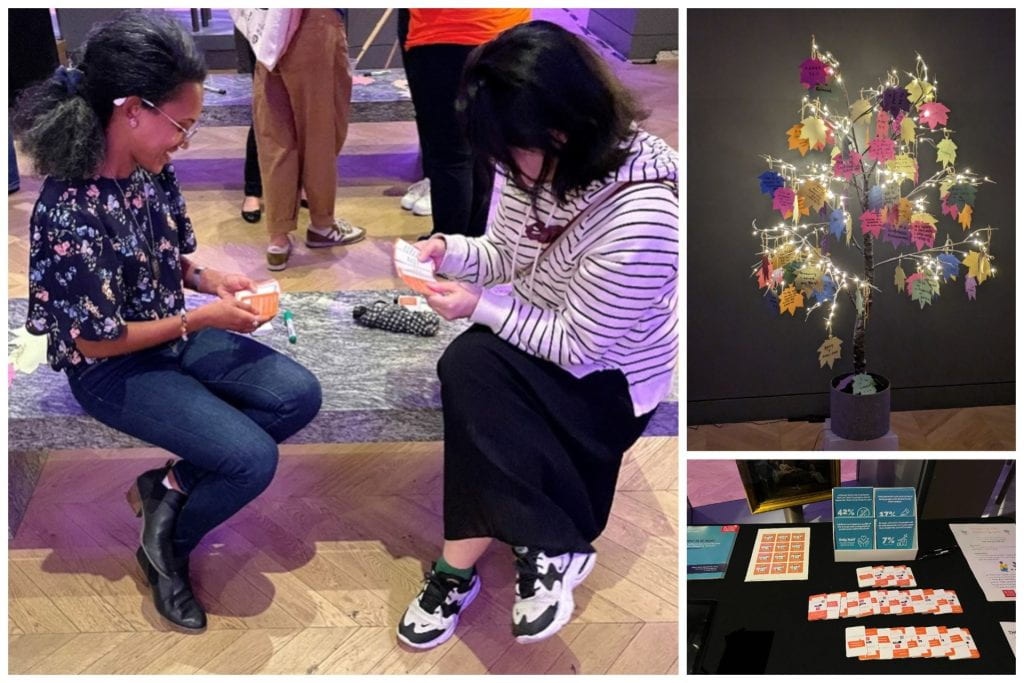How we talked to young adults about dementia and end-of-life care
By iomh, on 9 October 2023
Dementia and end of life care is a challenging topic to engage young adults with but the EMBED-Care team took the opportunity to do this by putting together an event for Science Museum Lates to engage young adults with these themes. Sophie Crawley describes their experiences.

The Science Museum in London is a well-known destination for families and children to spend a day looking at all things science related. A lesser-known aspect of the museum’s work are Science Museum Lates. These are primarily targeted as a young adult social event for groups of friends to attend. There is a lively and engaging atmosphere with music, DJs and a bar, while they explore the Museum’s regular exhibits after hours and engage with events and activities run by external groups centred around a specific science-related theme.
A conversation with the Science Museum about our work to improve the end-of-life care of people dying with or dying from dementia led to an offer to participate in a Lates event celebrating the 75th Anniversary of the NHS. This was a great opportunity to share our research with a young adult audience who may not have thought about dementia or the end of life, but who will be increasingly affected by dementia as the prevalence, and the need to care for those with a diagnosis, increases. It also gave all the EMBED-Care team from UCL and King’s College London an opportunity to collectively ‘have a go’ at public engagement.
To prepare, several members of the team attended a Lates event to look at the set-up, the different stands and activities on offer and gauge what attracted interest. Armed with this information the team devised our own event. We started with a long list of ideas for activities, which we refined to reflect our aim; to raise awareness of dementia, particularly that people will die with or from dementia. We also wanted to highlight the importance sharing their end of life wishes with family and friends and that in the context of dementia this is done prior to losing capacity.
The team settled on three activities:
Card Game: ‘Knowing me, Knowing you’ was a simple card game involving thirteen cards with a brief descriptor that may be important to someone as they come to the end of their life. All the content came from findings from EMBED-Care and included, ‘to be surrounded by the people I care about’ or ‘to be able to remain at home’. Two additional cards were included for people to add their own ideas. In pairs, visitors reviewed the cards with each picking their top three cards before trying to guess what the other person had chosen. This led to several revelations and a realisation of the importance of sharing information with family and friends.
Wishing Tree: Visitors were invited to write on a leaf what would be important to them at the end of life, with leaves then being hung on an electric tree. This simple activity was popular and was a more contemplative activity.

Quiz: In Spring 2022 we ran a YouGov survey to explore the UK population’s knowledge of dementia and palliative care. The findings formed questions for visitors to test themselves against. This was run via Survey Monkey on tablets we provided or via QR codes, although these did not work very well on the night. A sticker was awarded for those scoring top marks.
We also ‘branded’ the team with everyone wearing bright orange t-shirts with EMBED-Care emblazoned on the front and an offer to ‘ask me anything about dying with dementia’ on the back.
Reflections
We successfully accomplished our goal of captivating a young adult audience by incorporating engaging, enjoyable activities that tackled the themes of dementia and end-of-life care without being laden with doom and gloom. Our stand remained bustling and lively throughout the evening. Many younger people wanted to talk about their experiences, with grandparents and even parents with dementia, and learn more about the disease.
When planning a similar event, take time to think about your audience and what you want to get across with your activity. We had a small budget, but this is not essential as activities can be developed accordingly: our ‘tree’ could have been a washing line between two stands. The Lates are a social and fun evening so we found the competitive element of the card game activity worked well in this setting. We found we didn’t need to re-invent the wheel and by attending an earlier Lates it gave us an insight into the types of activities that are likely to work.
Sophie Crawley is a Research Fellow in the Marie Curie Palliative Care Research Department
Programme Information: Empowering Better End of Life Dementia Care (EMBED-Care) is jointly by the Economic and Social Research Council (ESRC) and the National Institute for Health Research (NIHR) through the ESRC/NIHR Dementia Initiative 2018 (Grant Reference Number ES/S010327/1). ESRC is part of the UK Research and Innovation. The views expressed are those of the author(s) and not necessarily those of the ESRC, UKRI, NHS, the NIHR or the Department of Health and Social Care.
 Close
Close

